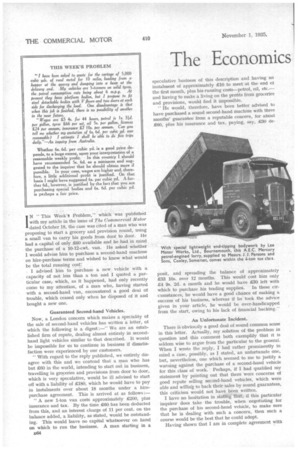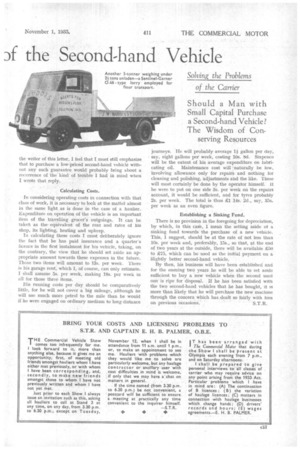The Economics
Page 122

Page 123

If you've noticed an error in this article please click here to report it so we can fix it.
Df the Second-hand Vehicle Solving the Problems of the Carrier
Should a Man with Small Capital Purchase a Second-hand Vehicle? The Wisdom of Con.
serving Resources
IN "This Week't Problem," Which was published with my article in the issue of The Commercial Motor dated October 18, the case was cited of a man who was proposing to start a grocery and provision round, using a small van to carry his goods from door to door. He had a capital of only £60 available and he had in mind the purchase of a 10-12-cwt. van. He asked whether I would advise him to purchase a second-hand machine on hire-purchase terms and wished to know what would be the total running cost: I advised him to purchase a new vehicle with a capacity of not less than a ton and I quoted a particular case; which, as it happened, had only recently come to my attention, of a man who, having started with a second-hand van, encountered a good deal of trouble, which ceased only when he disposed of it and bought a new one.
Guaranteed Second-hand Vehicles.
Now, a London concern which makes a speciality of the sale of second-hand vehicles has written a letter, of which the following is a digest :—" We are an established firm of repute, dealing almost entirely in secondhand light vehicles similar to that described. It would be impossible for us to continue in business if dissatisfaction were experienced by our customers.
"With regard to the reply published, we entirely disagree with this and we contend that a man who has but £60 in the world, intending to start out in business, travelling in groceries and provisions from door to door, which is very speculative, would be ill advised to start off with a liability of £180, which he would have to pay in instalments over about 18 months under a hirepurchase agreement. This is arrived at as follows:—
"A new 1-ton van costs; approximately £200, plus insurance and tax. By the time £60 has been deducted from this, and an interest charge of 11 per cent, on the balance added, a liability, as stated, would be outstanding. This would leave no capital whatsoever on hand on which to run the business. A man starting in a
speculative business of this description and having an instalment of approximately £10 to meet at the end of the first month, plus his running costs—petrol, oil, etc.— and having to make a living on the profits from groceries and provisions, would find it impossible.
"He would, therefore, have been better advised to have purchased a sound second-hand machine with three months' guarantee from a reputable concern, for about £60, plus his insurance and tax, paying, say, £30 de posit, and spreading the balance of approximately £33 10s. over 12 months. This would cost him only £4 9s. 2d. a month and he would have £30 left with which to purchase his trading supplies. In these circumstances, he would have a good chance of making a success of his business, whereas if he took the advice given in your article, he would be over-handicapped from the start, owing to his lack of financial backing."
An Unfortunate Incident.
There i:s obviously a good deal of sound common sense in this letter. Actually, my solution of the problem in question and this comment both exemplify that it is seldom wise to argue from the particular to the general. When I wrote the reply, I had rather prominently in mind a case, possibly, as I stated, an unfortunate one, but, nevertheless, one which seemed to me to justify a warning against the purchase of a second-hand vehicle for this class of work. Perhaps, if I had qualified my statement by pointing out that there were concerns of good repute selling second-hand vehicles, which were able and willidg to back their sales by sound guarantees, this criticism would not have been written.
I have no hesitation in stating that, if this particular inquirer does take the trouble, when negotiating for the purchase of his second-hand vehicle, to make sure that he is dealing with such a concern, then such a course would be the best that he could adopt.
Having shown that I am in complete agreement with the writer of this letter, I feel that I ,must still emphasize that to purchasea low-priced second-hand vehicle Without any such gilara.ntee would probably bring about a recurrence of the kind of 'trouble I had in mind when I wrote that reply.
Calculating Costs.
.In considering operating costs in connection with that class of work, it is necessary to look at the rnattet almost in the same light as is done in the case. of a haulier. Expenditure on -operation of the vehicle is an important item of the travelling grocer's outgoings. It can be takeft as the equivalent of the rent and rates of his shop, its lighting, heating and upkeep.
In calculating these costs I must deliberately ignore the fact that he has paid insurance and a quarter's licence in the first instalment for his vehicle, taking, on the contrary, the view that he should -set aside an appropriate amount towards these expenses in the future. Those two items will amount to 13s. per week. There is his garage rent, which I, of course, can only estimate. I shall assume 5s. per week, making 18s. per week in all for those three items.
His running costs per day should be comparatively little, for he will not cover a big mileage, although he will use much more petrol to the mile than he would if he were engaged on ordinary medium to lorigj.distance journeys-. Be will probably average 13 gallon per day, say, eight gallons per week, costing 10s. 8d. Sixpence will be the extent of his average expenditure on lubricating oil. Maintenance cost will naturally be low, involving allowance only for repairs and nothing for cleaning and polishing, adjustments and the like. These will most certainly be done by the operator himself. if he were to put on one side 3s. per week on the repairs account, it would be sufficient, and for tyres probably 2s. per week. The total is thus £1 14s. 2d., say, 35s. per week as an even figure.
Establishing a Sinking Fund.
There is no provision in the foregoing for depreciation, by which, in this case, 1 mean the setting aside of a sinking fund towards the purchase of a new vehicle. This, I suggest, should be at the rate of not less than 10s. per week and, preferably, 15s., so that, at the end of two years at the outside, there will be available £50 to £75, which can be used as the initial payment on a lightly better second-hand vehicle.
By then, his business will have been established and for the ensuing two years he will be able to set aside sufficient to buy, a new vehicle when the second used one is ripe for disposal, If he has been satisfied with the two second-hand vehicles that he has bought, it is more than likely that he will purchase the new machine through the concern which has dealt so fairly with him
on previous occasions. S.T.R.
















































































































































































